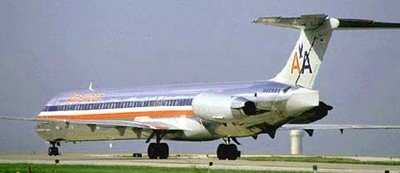Says Management Windfall Could Exceed Year's Profits
 The Allied Pilots
Association, collective bargaining agent for the 12,000 pilots of
American Airlines, expressed its outrage over executive bonuses
scheduled for payout in April it says could match or even exceed
the airline’s fiscal year 2006 net profit of $231 million announced by parent company
AMR.
The Allied Pilots
Association, collective bargaining agent for the 12,000 pilots of
American Airlines, expressed its outrage over executive bonuses
scheduled for payout in April it says could match or even exceed
the airline’s fiscal year 2006 net profit of $231 million announced by parent company
AMR.
According to a release from APA, based on Tuesday’s
closing price of $40.23 per share for AMR stock, the April bonuses
will total some $218 million. The exact amount of executive bonuses
depends on the price of AMR stock on April 18. APA says a
disproportionate share of the company's profits will go to around
50 senior executives.
"It’s clear that American Airlines’ financial
performance has improved substantially, thanks in large measure to
the deep sacrifices by our pilots and other employees beginning in
2003," said Captain Ralph Hunter, APA President. "The $1.1 billion
improvement in AMR’s results would not have been possible
without the $1.6 billion in annual concessions agreed to by AA
non-management employees, who are the real heroes behind
American’s return to profitability. While line employees are
still carrying the burden of these massive cuts in pay and
benefits, it is insulting for senior managers to be receiving a
windfall that may equal or exceed all of our airline’s
earnings in 2006."
Raising questions about the airline's performance over the past
year, Hunter questioned whether management has performed to a level
warranting the bonuses.
"It is particularly egregious to pay large bonuses when our
airline has been experiencing such serious operational problems.
Aren't bonuses normally paid for a job well done?"
Hunter cited the widely publicized incidents that occurred on
Dec. 29, 2006 -- such as American Airlines Flight 1348, which sat on the tarmac in Austin, Texas for
some eight hours with no food or water and overflowing
toilets. Hunter claims the Captain elected to taxi to the terminal,
against on-duty managers’ refusal to provide a gate. He says
the incident is symptomatic of a management team more concerned
with its compensation than with improving the airline’s
lagging operational performance.
According to Hunter, when APA contacted management to ask how it
planned to prevent such operational miscues in the future,
management justified its performance by noting that no one was hurt
on December 29.
"Safe transportation is the absolute minimum our passengers
expect and deserve. Not injuring anyone is a wholly unsuitable
measure of success," Hunter said.
Hunter also decried management's announcement the airline had
improved its position with two key performance and customer
satisfaction rating organizations. Although American did improve
over previous ratings, it still ranked fourth on a DOT
dependability rating, and fifth in a public opinion survey.
Hunter said, "We believe the airline would be better served by
management focusing on how to improve customer service, rather than
celebrating mediocrity."

Hunter also blasted management for the airline's failure to
capture a DFW-Beijing route recently opened by the DOT. Four
airlines bid for the route which United eventually won.
APA had attempted unsuccessfully to grab some concessions from
the company in exchange for changes in duty day limitations.
Limits on the time a pilot may fly in APA's current labor agreement
with American makes a direct DFW-Beijing flight impossible.
Hunter said, "The China route award was within American’s
grasp, yet management made little more than superficial attempts to
negotiate the necessary pilot contractual provisions to make it
happen."
Instead, American amended its proposal to add a stop in Chicago.
Hunter says the concessions APA asked for were less expensive than
the amended route proposal the DOT eventually rejected.
Hunter concluded by saying, "Management’s recent decisions
are costing American Airlines millions in lost opportunities. They
should stop rewarding themselves for their failures."
 Aero-News: Quote of the Day (04.28.25)
Aero-News: Quote of the Day (04.28.25) ANN's Daily Aero-Term (04.28.25): Decision Altitude (DA)
ANN's Daily Aero-Term (04.28.25): Decision Altitude (DA) ANN's Daily Aero-Linx (04.28.25)
ANN's Daily Aero-Linx (04.28.25) Airborne-Flight Training 04.24.25: GA Refocused, Seminole/Epic, WestJet v TFWP
Airborne-Flight Training 04.24.25: GA Refocused, Seminole/Epic, WestJet v TFWP Aero-News: Quote of the Day (04.29.25)
Aero-News: Quote of the Day (04.29.25)




